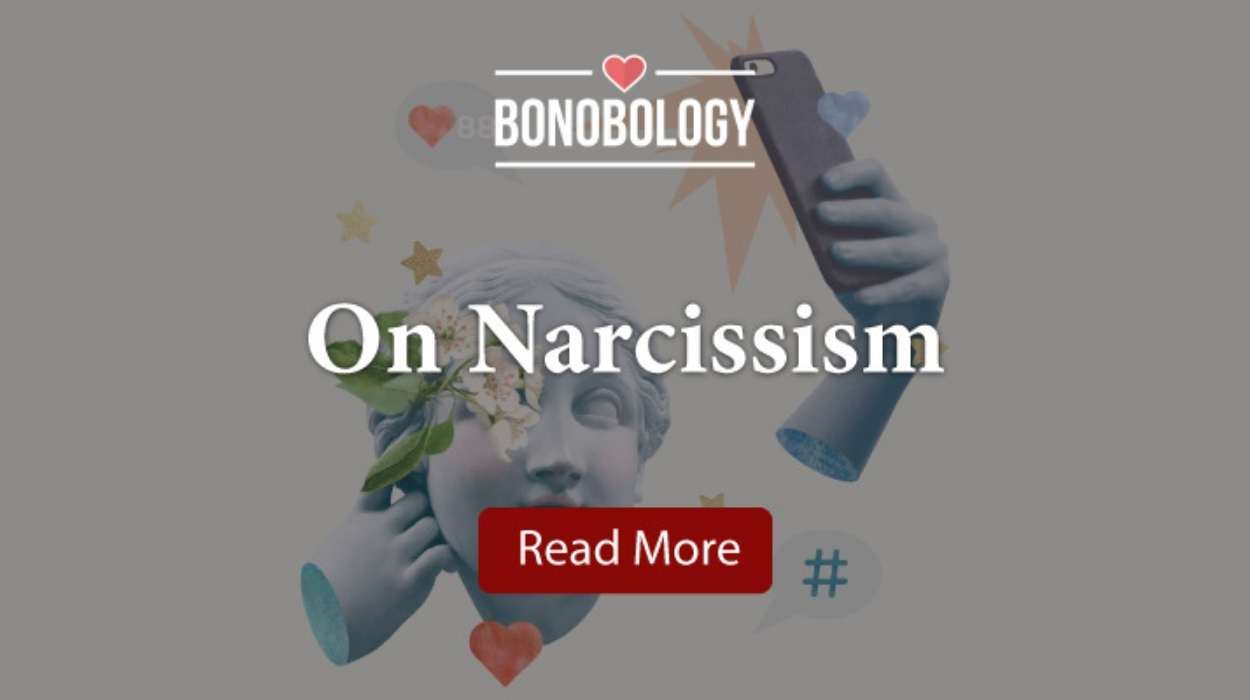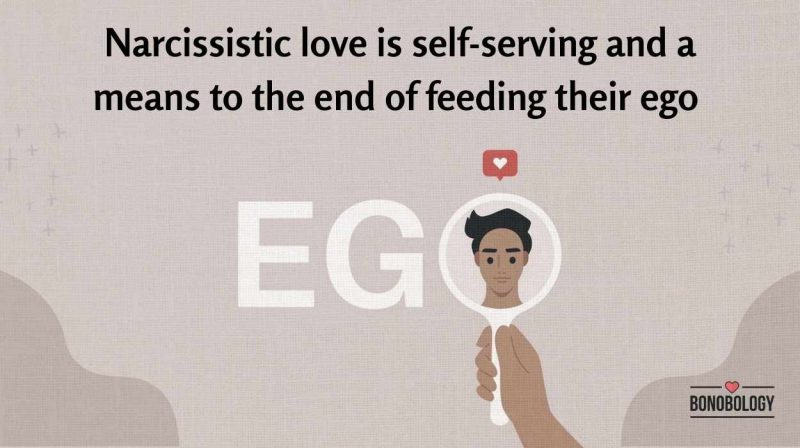Are narcissists capable of love? This is a question that weighs on the minds of a lot of people who have endured the narcissistic love patterns of idealization, devaluation, discarding, and hoovering. If you’re wrestling with it too, know that you’re not alone.
We understand how emotionally draining and tumultuous a relationship with a narcissist can be. And it can leave you convinced that the person perpetuating all this chaos in your life cannot possibly be capable of love. However, in reality, a narcissist can technically love someone but their feelings are fleeting and superficial at best.
What does “fleeting and superficial” mean? How does it translate into their behavior in a relationship? To help you find the answers, let’s take a deeper look at the intricacies of a narcissist in love in consultation with California-based psychiatrist and Cognitive Behavior Therapist Dr. Shefali Batra (MD in psychiatry), who specializes in counseling for separation and divorce, breakup and dating, and premarital compatibility issues. But first, let’s make sure you understand who a narcissist really is.
Who Is A Narcissist?
Table of Contents
The word narcissist is often casually thrown around to define anyone with an inflated need for admiration and attention, and a self-centered attitude. However, not everyone who enjoys more than a healthy dose of self-love is a narcissist.
Another common misconception is that exhibiting narcissistic behavior is the same as having narcissistic personality disorder (NPD). However, that’s far from the truth too. Narcissism exists on a spectrum and only people on the highest end of this spectrum are considered to have narcissistic personality disorder.
According to the Diagnostic and Statistical Manual of Mental Disorders, 5th edition (DSM-5), a person can be diagnosed with NDP if they exhibit five or more of the following traits:
- Inflated sense of self-importance
- Displays of grandiosity
- Arrogant attitudes and behavior
- Envy toward other
- Lack of empathy
- Exploiting others for own advantage
- Preoccupation with fantasies about unlimited power, intelligence, beauty, or success
- Excessive need for admiration
- Sense of entitlement
Dr. Batra says, “Narcissism is characterized by a lack of self-worth, low self-esteem, and incomplete sense of self-identity that results in a dysfunctional thought process, which is expressed outwardly as self-focused, unempathetic, and attention-seeking behavior.”
This distinction is important because according to a US-centric research, only 0.5%-5% of adults have NPD. If an individual has a few narcissistic tendencies, they may still be able to experience and express love almost the same way as any other person would. And if you’re with such a person, you wouldn’t be asking, “Is a narcissistic person capable of love?”
Sure, there may be some relationship challenges along the way. “However, these traits in people on the lower end of the narcissism spectrum are too mild to affect their ability to love another person. On the other hand, NPD traits impede a person’s ability to love another, at least in a way that most people understand love,” Dr. Batra adds.
Now that we’ve cleared that up, let’s help you address a few other questions that will help you navigate your situation better: Are narcissists capable of love? How does a narcissist show love?
Related Reading: What Are The Examples Of Narcissistic Behavior In A Relationship?
How To Know If A Narcissist Loves You
Narcissism and love rarely go well together. Sure, a narcissist, charming and charismatic as they are, may sweep you off your feet with their grand gestures and displays of love. At that stage, questions like are narcissists affectionate or how does a narcissist show love wouldn’t even cross your mind because the person in front of you feels just so perfect and right.
However, as narcissistic love patterns go, this stage — known as idealization and characterized by love-bombing — is often short-lived and transactional (contingent on how well and for how long it serves their need for narcissistic supply). Because of this, they struggle to maintain healthy connections in their life or genuine feelings for another person.

The bottom line is, it’s rare to see a narcissist fall in love permanently. So, if you’re wondering how to know if a narcissist loves you, ask yourself:
- Do they take your needs and feelings into consideration?
- Do they treat you with respect?
- Do they take responsibility for their actions?
- Can they appreciate you?
- Do they honor your boundaries in the relationship?
- Do they value your opinions and emotions?
- And most importantly, are they able to put your needs first even in situations they stand to gain nothing in return?
If you’ve answered these questions in the affirmative, you have a narcissist in love with you. However, Dr. Batra warns, “The chances of that happening are slim to none in most cases because a narcissist can’t love unless they are willing to work on fixing their behavior and their thought patterns. This requires a great deal of self-reflection and introspection, which can be overwhelming and even a scary proposition for a narcissist.”
More often than not, a narcissist would much rather resort to scapegoating, gaslighting, and other manipulation tactics rather than do the inner work to break free from their patterns.
Related Reading: 33 Phrases To Shut Down Gaslighting And Silence Gaslighters
Are Narcissists Capable Of Love?
Are narcissists capable of love? This can be a tricky question to address because narcissistic love is often self-serving, much like every other aspect of their existence, and far removed from the notions of meaningful connections and healthy relationships that others associate with love.
Dr. Batra explains, “The problem about narcissists being capable of love stems from the fact that their cup of love to offer is already full. They only love themselves. The lack of love in the earlier days of life, especially from caregivers [parents] makes them struggle through their life to feel and be accepted. They function from a space of deficit.
“If you see it from an evolutionary standpoint their self-love is justified because they never got it from anyone. But in the real world, it is unreasonable, unacceptable, and outright dysfunctional. So they turn toward those who care for them — that’s why empaths and narcissists often attract one another — but the relationship is purely transactional and not the genuine love that you see elsewhere.
“They will give care and attention back but the moment this loved object opposes them or doesn’t feed their ego, they will outright reject them and feel miserable from within too.” So, to answer your question — is a narcissistic person capable of love? — not in the real sense of the word. Dr. Batra lists the reasons why a narcissist can’t love another person fully and whole-heartedly:
- They do not care for or feel close to anyone because their brain is not geared to do so
- They cannot look beyond their own needs
- They possess such an overpowering self-preservation instinct that their hypervigilance and emotional reactivity to rejection makes them highly impulsive
- Insecure inner working models make them perceive themselves as unworthy or unwanted
- Pathologically uncomfortable in scenarios where they’re not the center of attention
Related Reading: How To Get Out Of An Unhealthy Relationship: A Step-by-Step Guide
“If there’s a narcissist in love with you, or at least claims to be, to assess the authenticity of their feelings, you need to look beyond their words — which they have a way with — and see how they treat you. If they actually treat you with respect, care, and concern, they may have some sort of feelings for you,” she adds.
Ultimately, it boils down to the fact that a narcissist can technically love another person but it won’t even be the wholesome, unconditional love you’d expect in an intimate relationship. They can’t genuinely love someone.
What does a narcissist think love is?
As we said, a narcissist can technically love but their idea of what love feels like can be skewed. Dr. Batra says, “Narcissistic love is devoid of the notion of reciprocity. For a narcissist, love is a means to seek external validation to boost their self-esteem and feel better about themselves. They continue to experience what they believe is love as long as this need is met. That’s why it’s rare to see a narcissist fall in love permanently.”

If you’re wondering, “Can a narcissist love?”, know that what they perceive as love is aligned with their pervasive patterns of need for attention, self-importance, and admiration. A narcissist’s love, ultimately, boils down to:
- Sense of entitlement that makes them feel that love is owed to them
- Need for unconditional admiration from their partners
- Grand displays of affection and expressions of undying love without any meaningful connection
- An exhilarating sense of excitement that makes them feel good about themselves
This results in a superficial bond that often paves the way for a one-sided and toxic dynamic as the relationship progresses.
Related Reading: Grey Rock Method: Meaning, Techniques, And Ways To Use It Effectively
How does a narcissist show love?
Are narcissists affectionate? Yes, a narcissist can be immensely affectionate, charming, disarming, and loving, especially at the beginning of a romance. But is a narcissistic person capable of love? I think, by now, you know the answer to that question is a clear, resounding no — at least, as long as you’re viewing their understanding and expression of love from the standpoint of what love looks like in a healthy relationship.
It’s crucial to be aware of this connection between narcissism and love to not get swept up by the way a narcissist shows love. According to Dr. Batra, this includes:
- Being obsessed with the need to be adored and admired by their romantic partners
- Romantic manipulation through grand displays of affection
- Love-bombing their partners
- Sweeping them off their feet with gifts and compliments
- Always saying the right things at the right time to charm and disarm
This results in an emotionally charged relationship that can be hard to sustain, resulting in intense highs and lows. A study published in the Journal of Personality and Social Psychology suggests that this is primarily why narcissists fail at long-term, committed relationships but might excel at short-term dating.

What To Do If You’re In Love With A Narcissist
To live with a narcissist and be happy is like trying to fill a bucket with a giant hole at the bottom. If you’re in love with a narcissist, self-preservation should be your top priority and that begins by understanding that real love is not self-serving, exploitative, envious, or boastful. But when you’re in a relationship with a narcissist, that’s what you get in the name of love. Peppered with toxicity, drama, and trauma. Because when a narcissist knows you love him/her, that’s why they unleash the whole gamut of their toxic tendencies on you.
You may find yourself at the receiving end of gaslighting, love bombing, manipulation, and even abuse. If things have escalated to the extent of abuse, you need to reach out for help.
If you are in immediate danger, call 9-1-1.
For anonymous, confidential help, 24/7, please call the National Domestic Violence Hotline at 1-800-799-7233 (SAFE) or 1-800-787-3224 (TTY).
However, if you’ve spotted your partner’s narcissistic tendencies early on, there are ways to navigate the relationship and minimize the emotional harm it may cause you. While it may not be realistic to expect that you can live with a narcissist and be happy, the following steps can help you protect yourself:
- Establish boundaries: It’s crucial to establish and enforce healthy relationship boundaries when you’re in a relationship with a narcissist. If done early on, this can go a long way in keeping you safe from narcissistic abuse
- Practice self-care: Don’t lose yourself in the relationship. Your partner’s need for admiration, attention, and adoration is a bottomless pit. You need to reset from time to time, reassess your priorities, and refocus on yourself
- Educate yourself: Knowledge and awareness about what you’re dealing with is the best way to combat it effectively. Learn as much as you can about narcissistic personality disorder and its ramifications on relationships. This will equip you to address relationship problems as they arise
- Seek counseling: The emotional toll and trauma of being in love with a narcissist can be huge. Therapy offers a safe space for you to explore the many confusing emotions you may be struggling with and process them. The process can be immensely beneficial in helpful in identifying your own triggers, developing coping skills, and figuring out what you want for yourself
- Encourage your partner to get help: NPD is a serious mental health disorder that requires the right treatment and help. However, people afflicted by it are often not open to the idea of seeking help because they are not ready to accept that something is wrong with them. While you can’t make your partner get the help they need, it can be helpful to encourage them to seek it by normalizing this idea for them
Key Pointers
- A narcissist may not feel or express love in the same ways that others do because their brain is not geared to do so
- While a narcissist may experience romantic feelings and love for someone, they just view it as a means of external validating and seeking an ego boost
- A may continue to portray feelings of love for a person as long as they offer them their narcissistic supply through unconditional love and adoration
- When a narcissist knows you love him/her, they may come at you with the whole gamut of their toxic tendencies — gaslighting, manipulation, abuse
- To be able to deal with being in love with a narcissist, you must set boundaries, prioritize self-care, and seek professional help
All in all, narcissism and love don’t mix well. If you came here hoping for a different answer to “Are narcissists capable of love”, we’re sorry to have disappointed you. But opening your eyes to the reality of the situation is absolutely crucial for being able to deal with it to the best of your ability. And that’s what we’re here for. To help you find the answers and a way forward in even the grimmest looking circumstances in life.
7 Stages In Narcissistic Relationship Pattern And How To Avoid Them
What Are The Examples Of Narcissistic Behavior In A Relationship?
Your contribution does not constitute a charitable donation. It will allow Bonobology to continue bringing you new and up-to-date information in our pursuit of helping anyone in the world to learn how to do anything.
Ask Our Expert
You must be Logged in to ask a question.


Featured
21 Signs That You Are Alone In A Relationship
11 Situationship Red Flags You Should Know About
Why Do I Get Attached So Easily? 9 Possible Reasons and Ways to Stop
How To Respond To DARVO: Expert Lists 7 Strategies
What Is Fexting, And Why Is It Bad For Your Relationship?
11 Prominent Male Narcissist Traits to Watch For
Why Does My Girlfriend Hit Me? Expert Shares 11 Possible Reasons And Ways To Cope
How Does A Narcissist React When They Can’t Control You?
“My Anxiety Is Ruining My Relationship”: 6 Ways It Does And 5 Ways To Manage It
13 Distinctive Traits Of Female Narcissists Revealed
Recognizing The 13 Red Flags Of A Controlling Relationship
What Are The Examples Of Narcissistic Behavior In A Relationship?
11 Signs He Is Forcing Himself To Love You
21 Signs The Relationship Is Over For Him and How To Deal With It
21 Stages Of A Narcissistic Relationship With An Empath
Understanding Hysterical Bonding: What It Is And Why It Happens
19 Glaring Social Media Red Flags In Relationships You Should Never Ignore
Lying By Omission And Its Consequences On Relationships
Practical Steps To Heal From Codependency And Rebuild Your Life
Indifference In Relationships — Causes, Signs And Coping Tips